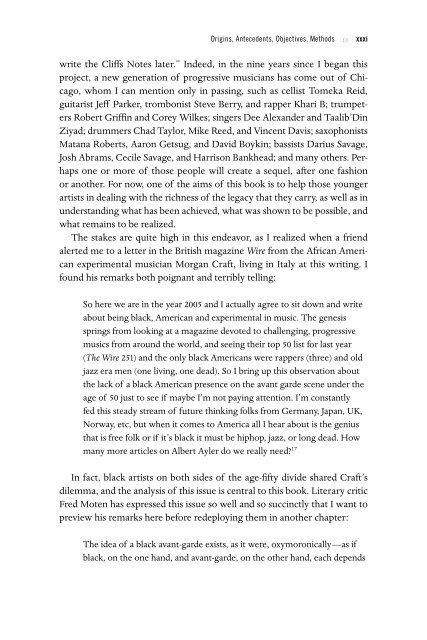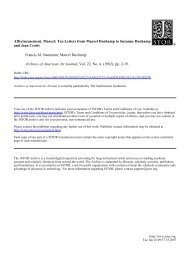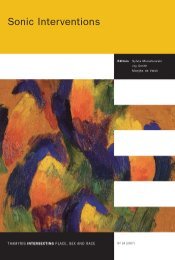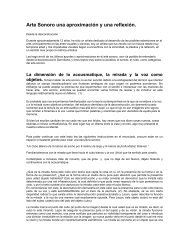- Page 2: A POWER STRONGER THAN ITSELF
- Page 5 and 6: GEORGE E. LEWIS is the Edwin H. Cas
- Page 7 and 8: vi : : Contents 4 FOUNDING THE COLL
- Page 10 and 11: THE AACM AND AMERICAN EXPERIMENTALI
- Page 12 and 13: The AACM and American Experimentali
- Page 14: The AACM and American Experimentali
- Page 17 and 18: xvi : : Acknowledgments Griffi n; a
- Page 19 and 20: xviii : : Acknowledgments work was
- Page 21 and 22: xx : : Acknowledgments Special than
- Page 24 and 25: introduction AN AACM BOOK: ORIGINS,
- Page 26 and 27: Origins, Antecedents, Objectives, M
- Page 28 and 29: Origins, Antecedents, Objectives, M
- Page 30 and 31: Origins, Antecedents, Objectives, M
- Page 34 and 35: Origins, Antecedents, Objectives, M
- Page 36 and 37: chapter summaries This study of the
- Page 38 and 39: Chapter Summaries : : xxxvii educat
- Page 40 and 41: Chapter Summaries : : xxxix proven
- Page 42 and 43: Chapter Summaries : : xli sion of s
- Page 44 and 45: Chapter Summaries : : xliii receive
- Page 46 and 47: Chapter Summaries : : xlv visative
- Page 48 and 49: Chapter Summaries : : xlvii the att
- Page 50 and 51: FOUNDATIONS AND PREHISTORY Coming N
- Page 52 and 53: Foundations and Prehistory : : 3 ev
- Page 54 and 55: Foundations and Prehistory : : 5 bu
- Page 56 and 57: Foundations and Prehistory : : 7 ch
- Page 58 and 59: Foundations and Prehistory : : 9 Ea
- Page 60 and 61: Foundations and Prehistory : : 11 f
- Page 62 and 63: Foundations and Prehistory : : 13 s
- Page 64 and 65: Foundations and Prehistory : : 15 w
- Page 66 and 67: Foundations and Prehistory : : 17 m
- Page 68 and 69: Foundations and Prehistory : : 19 w
- Page 70 and 71: Foundations and Prehistory : : 21 O
- Page 72 and 73: Foundations and Prehistory : : 23 r
- Page 74 and 75: Foundations and Prehistory : : 25 W
- Page 76 and 77: Foundations and Prehistory : : 27 B
- Page 78 and 79: NEW MUSIC, NEW YORK Cultures of Spo
- Page 80 and 81: New Music, New York : : 31 fl eeing
- Page 82 and 83:
New Music, New York : : 33 Departme
- Page 84 and 85:
New Music, New York : : 35 Mayfi el
- Page 86 and 87:
New Music, New York : : 37 Beyond a
- Page 88 and 89:
New Music, New York : : 39 the beat
- Page 90 and 91:
New Music, New York : : 41 Scott De
- Page 92 and 93:
New Music, New York : : 43 among yo
- Page 94 and 95:
New Music, New York : : 45 riod. Th
- Page 96 and 97:
New Music, New York : : 47 regardle
- Page 98 and 99:
New Music, New York : : 49 features
- Page 100 and 101:
New Music, New York : : 51 the demi
- Page 102 and 103:
New Music, New York : : 53 wanted t
- Page 104 and 105:
THE DEVELOPMENT OF THE EXPERIMENTAL
- Page 106 and 107:
The Development of the Experimental
- Page 108 and 109:
The Development of the Experimental
- Page 110 and 111:
The Development of the Experimental
- Page 112 and 113:
The Development of the Experimental
- Page 114 and 115:
The Development of the Experimental
- Page 116 and 117:
The Development of the Experimental
- Page 118 and 119:
The Development of the Experimental
- Page 120 and 121:
The Development of the Experimental
- Page 122 and 123:
The Development of the Experimental
- Page 124 and 125:
The Development of the Experimental
- Page 126 and 127:
The Development of the Experimental
- Page 128 and 129:
The Development of the Experimental
- Page 130 and 131:
The Development of the Experimental
- Page 132:
The Development of the Experimental
- Page 135 and 136:
86 : : Chapter Four generalizations
- Page 137 and 138:
88 : : Chapter Four ogy of Chicago
- Page 139 and 140:
90 : : Chapter Four composer. In th
- Page 141 and 142:
92 : : Chapter Four business end of
- Page 143 and 144:
94 : : Chapter Four dictate.” 44
- Page 145 and 146:
96 : : Chapter Four Born on the Kit
- Page 147 and 148:
98 : : Chapter Four matters, fi nan
- Page 149 and 150:
100 : : Chapter Four certs, you see
- Page 151 and 152:
102 : : Chapter Four the music that
- Page 153 and 154:
104 : : Chapter Four to ensure that
- Page 155 and 156:
106 : : Chapter Four in the room,
- Page 157 and 158:
108 : : Chapter Four Cohran’s 75t
- Page 159 and 160:
110 : : Chapter Four they want to r
- Page 161 and 162:
112 : : Chapter Four about race.
- Page 163 and 164:
114 : : Chapter Four that we clearl
- Page 165 and 166:
116 : : Chapter Five never quite ab
- Page 167 and 168:
118 : : Chapter Five that is conduc
- Page 169 and 170:
120 : : Chapter Five as well as the
- Page 171 and 172:
122 : : Chapter Five together, to s
- Page 173 and 174:
124 : : Chapter Five or system, but
- Page 175 and 176:
126 : : Chapter Five Myers fondly r
- Page 177 and 178:
128 : : Chapter Five Licking her wo
- Page 179 and 180:
130 : : Chapter Five interview), Ca
- Page 181 and 182:
132 : : Chapter Five In July 1966,
- Page 183 and 184:
134 : : Chapter Five the main site
- Page 185 and 186:
136 : : Chapter Five cians over a t
- Page 187 and 188:
138 : : Chapter Five studying black
- Page 189 and 190:
140 : : Chapter Five so, McIntyre
- Page 191 and 192:
142 : : Chapter Five free jazz of t
- Page 193 and 194:
144 : : Chapter Five topher was mor
- Page 195 and 196:
146 : : Chapter Five screamers, to
- Page 197 and 198:
148 : : Chapter Five a group of guy
- Page 199 and 200:
150 : : Chapter Five African civili
- Page 201 and 202:
152 : : Chapter Five words “. . .
- Page 203 and 204:
154 : : Chapter Five He just had pe
- Page 205 and 206:
156 : : Chapter Five Joseph Jarman
- Page 207 and 208:
158 : : Chapter Five older than Bra
- Page 209 and 210:
160 : : Chapter Five to his encount
- Page 211 and 212:
162 : : Chapter Five to “follow i
- Page 213 and 214:
164 : : Chapter Six AACM concert in
- Page 215 and 216:
166 : : Chapter Six I was pretty en
- Page 217 and 218:
168 : : Chapter Six the “Great Wa
- Page 219 and 220:
170 : : Chapter Six ent shows aroun
- Page 221 and 222:
172 : : Chapter Six all- black grad
- Page 223 and 224:
174 : : Chapter Six he was majoring
- Page 225 and 226:
176 : : Chapter Six Christian accur
- Page 227 and 228:
178 : : Chapter Six so we won’t b
- Page 229 and 230:
180 : : Chapter Six years may not h
- Page 231 and 232:
182 : : Chapter Six From time to ti
- Page 233 and 234:
184 : : Chapter Six Abrams and perf
- Page 235 and 236:
186 : : Chapter Six that there migh
- Page 237 and 238:
188 : : Chapter Six surge of intere
- Page 239 and 240:
190 : : Chapter Six prominent were
- Page 241 and 242:
192 : : Chapter Six one of jazz jou
- Page 243 and 244:
194 : : Chapter Six from a genre) w
- Page 245 and 246:
196 : : Chapter Six the approaches
- Page 247 and 248:
198 : : Chapter Six cording to Rout
- Page 249 and 250:
200 : : Chapter Six I’ll never sa
- Page 251 and 252:
202 : : Chapter Six perspective tha
- Page 253 and 254:
204 : : Chapter Six people thought
- Page 255 and 256:
206 : : Chapter Six After Charles a
- Page 257 and 258:
208 : : Chapter Six blacks particip
- Page 259 and 260:
210 : : Chapter Six bivalence than
- Page 261 and 262:
212 : : Chapter Six Detroit Artists
- Page 263 and 264:
214 : : Chapter Six It was not only
- Page 265 and 266:
216 : : Chapter Seven ket and begin
- Page 267 and 268:
218 : : Chapter Seven saw Steve, hi
- Page 269 and 270:
220 : : Chapter Seven the newly chr
- Page 271 and 272:
222 : : Chapter Seven Once the word
- Page 273 and 274:
224 : : Chapter Seven recalled, pre
- Page 275 and 276:
226 : : Chapter Seven right away. S
- Page 277 and 278:
228 : : Chapter Seven Art Ensemble
- Page 279 and 280:
230 : : Chapter Seven Ensemble comp
- Page 281 and 282:
232 : : Chapter Seven musical metho
- Page 283 and 284:
234 : : Chapter Seven vated by the
- Page 285 and 286:
236 : : Chapter Seven Kofsky, in th
- Page 287 and 288:
238 : : Chapter Seven upon construc
- Page 289 and 290:
240 : : Chapter Seven notions of ja
- Page 291 and 292:
242 : : Chapter Seven Moreover, as
- Page 293 and 294:
244 : : Chapter Seven I’ve never
- Page 295 and 296:
246 : : Chapter Seven Moye transfer
- Page 297 and 298:
248 : : Chapter Seven combined exte
- Page 299 and 300:
250 : : Chapter Seven John Coltrane
- Page 301 and 302:
252 : : Chapter Seven performance
- Page 303 and 304:
254 : : Chapter Seven beyond the no
- Page 305 and 306:
256 : : Chapter Seven “As time we
- Page 308 and 309:
THE AACM’S NEXT WAVE More from th
- Page 310 and 311:
The AACM’s Next Wave : : 261 was
- Page 312 and 313:
The AACM’s Next Wave : : 263 cian
- Page 314 and 315:
The AACM’s Next Wave : : 265 the
- Page 316 and 317:
The AACM’s Next Wave : : 267 The
- Page 318 and 319:
The AACM’s Next Wave : : 269 gran
- Page 320 and 321:
The AACM’s Next Wave : : 271 of d
- Page 322 and 323:
The AACM’s Next Wave : : 273 Lips
- Page 324 and 325:
The AACM’s Next Wave : : 275 life
- Page 326 and 327:
The AACM’s Next Wave : : 277 self
- Page 328 and 329:
The AACM’s Next Wave : : 279 basi
- Page 330 and 331:
The AACM’s Next Wave : : 281 mese
- Page 332 and 333:
The AACM’s Next Wave : : 283 cast
- Page 334 and 335:
The AACM’s Next Wave : : 285 my s
- Page 336 and 337:
The AACM’s Next Wave : : 287 boni
- Page 338 and 339:
The AACM’s Next Wave : : 289 the
- Page 340 and 341:
The AACM’s Next Wave : : 291 ting
- Page 342 and 343:
The AACM’s Next Wave : : 293 Who
- Page 344 and 345:
The AACM’s Next Wave : : 295 and
- Page 346 and 347:
The AACM’s Next Wave : : 297 mark
- Page 348 and 349:
The AACM’s Next Wave : : 299 musi
- Page 350 and 351:
The AACM’s Next Wave : : 301 to t
- Page 352 and 353:
The AACM’s Next Wave : : 303 Muha
- Page 354 and 355:
The AACM’s Next Wave : : 305 ris
- Page 356 and 357:
The AACM’s Next Wave : : 307 out
- Page 358 and 359:
The AACM’s Next Wave : : 309 turn
- Page 360 and 361:
The AACM’s Next Wave : : 311 note
- Page 362 and 363:
The AACM’s Next Wave : : 313 Moye
- Page 364 and 365:
The AACM’s Next Wave : : 315 wher
- Page 366 and 367:
The AACM’s Next Wave : : 317 ther
- Page 368 and 369:
The AACM’s Next Wave : : 319 The
- Page 370 and 371:
The AACM’s Next Wave : : 321 the
- Page 372 and 373:
The AACM’s Next Wave : : 323 rese
- Page 374 and 375:
THE AACM IN NEW YORK Migration and
- Page 376 and 377:
The AACM in New York : : 327 at the
- Page 378 and 379:
The AACM in New York : : 329 a revi
- Page 380 and 381:
The AACM in New York : : 331 ues in
- Page 382 and 383:
The AACM in New York : : 333 Steve
- Page 384 and 385:
The AACM in New York : : 335 Abrams
- Page 386 and 387:
The AACM in New York : : 337 a week
- Page 388 and 389:
The AACM in New York : : 339 own co
- Page 390 and 391:
The AACM in New York : : 341 mistic
- Page 392 and 393:
The AACM in New York : : 343 New Yo
- Page 394 and 395:
The AACM in New York : : 345 announ
- Page 396 and 397:
The AACM in New York : : 347 with c
- Page 398 and 399:
The AACM in New York : : 349 monthl
- Page 400 and 401:
The AACM in New York : : 351 provis
- Page 402 and 403:
The AACM in New York : : 353 ten ol
- Page 404 and 405:
The AACM in New York : : 355 In the
- Page 406 and 407:
The AACM in New York : : 357 CAD.:
- Page 408 and 409:
The AACM in New York : : 359 it cam
- Page 410 and 411:
The AACM in New York : : 361 of bla
- Page 412 and 413:
The AACM in New York : : 363 end, t
- Page 414 and 415:
The AACM in New York : : 365 When w
- Page 416 and 417:
The AACM in New York : : 367 promul
- Page 418 and 419:
The AACM in New York : : 369 Dett,
- Page 420 and 421:
The AACM in New York : : 371 radica
- Page 422 and 423:
The AACM in New York : : 373 compos
- Page 424 and 425:
The AACM in New York : : 375 On one
- Page 426 and 427:
The AACM in New York : : 377 tions
- Page 428 and 429:
The AACM in New York : : 379 visual
- Page 430 and 431:
The AACM in New York : : 381 such o
- Page 432 and 433:
The AACM in New York : : 383 ential
- Page 434 and 435:
The AACM in New York : : 385 time w
- Page 436 and 437:
The AACM in New York : : 387 ing co
- Page 438 and 439:
THE NEW REGIME IN CHICAGO 10 Genera
- Page 440 and 441:
The New Regime in Chicago : : 391 d
- Page 442 and 443:
The New Regime in Chicago : : 393 Y
- Page 444 and 445:
The New Regime in Chicago : : 395 a
- Page 446 and 447:
The New Regime in Chicago : : 397 r
- Page 448 and 449:
The New Regime in Chicago : : 399 I
- Page 450 and 451:
The New Regime in Chicago : : 401 O
- Page 452 and 453:
The New Regime in Chicago : : 403 i
- Page 454 and 455:
The New Regime in Chicago : : 405 a
- Page 456 and 457:
The New Regime in Chicago : : 407 m
- Page 458 and 459:
The New Regime in Chicago : : 409 M
- Page 460 and 461:
The New Regime in Chicago : : 411 K
- Page 462 and 463:
The New Regime in Chicago : : 413 I
- Page 464 and 465:
The New Regime in Chicago : : 415 N
- Page 466 and 467:
The New Regime in Chicago : : 417 i
- Page 468 and 469:
The New Regime in Chicago : : 419 q
- Page 470 and 471:
The New Regime in Chicago : : 421 d
- Page 472 and 473:
The New Regime in Chicago : : 423 w
- Page 474 and 475:
The New Regime in Chicago : : 425 a
- Page 476 and 477:
The New Regime in Chicago : : 427 m
- Page 478 and 479:
The New Regime in Chicago : : 429 m
- Page 480 and 481:
The New Regime in Chicago : : 431 a
- Page 482 and 483:
The New Regime in Chicago : : 433 h
- Page 484 and 485:
The New Regime in Chicago : : 435 e
- Page 486:
The New Regime in Chicago : : 437 A
- Page 489 and 490:
440 : : Chapter Eleven bers, many o
- Page 491 and 492:
442 : : Chapter Eleven uphold and n
- Page 493 and 494:
444 : : Chapter Eleven a conservati
- Page 495 and 496:
446 : : Chapter Eleven In the 1980s
- Page 497 and 498:
448 : : Chapter Eleven writer Howar
- Page 499 and 500:
450 : : Chapter Eleven Favors inclu
- Page 501 and 502:
452 : : Chapter Eleven however, as
- Page 503 and 504:
454 : : Chapter Eleven all the phon
- Page 505 and 506:
456 : : Chapter Eleven more evident
- Page 507 and 508:
458 : : Chapter Eleven From the per
- Page 509 and 510:
460 : : Chapter Eleven to Ajaramu,
- Page 511 and 512:
462 : : Chapter Eleven so she went
- Page 513 and 514:
464 : : Chapter Eleven Nonetheless,
- Page 515 and 516:
466 : : Chapter Eleven bolically im
- Page 517 and 518:
468 : : Chapter Eleven but even mor
- Page 519 and 520:
470 : : Chapter Eleven I’m out, b
- Page 521 and 522:
472 : : Chapter Eleven tages by the
- Page 523 and 524:
474 : : Chapter Eleven all out of w
- Page 525 and 526:
476 : : Chapter Eleven Nurullah.
- Page 527 and 528:
478 : : Chapter Eleven instrumental
- Page 529 and 530:
480 : : Chapter Eleven don’t have
- Page 531 and 532:
482 : : Chapter Twelve who was asso
- Page 533 and 534:
484 : : Chapter Twelve lier times i
- Page 535 and 536:
486 : : Chapter Twelve central dest
- Page 537 and 538:
488 : : Chapter Twelve can traditio
- Page 539 and 540:
490 : : Chapter Twelve Vandy Harris
- Page 541 and 542:
492 : : Chapter Twelve is. Genre- b
- Page 543 and 544:
494 : : Chapter Twelve aware that f
- Page 546 and 547:
afterword The Way of the Arranger A
- Page 548 and 549:
Afterword : : 499 the charter of th
- Page 550 and 551:
Afterword : : 501 “I didn’t hav
- Page 552 and 553:
Afterword : : 503 “This issue is
- Page 554 and 555:
Afterword : : 505 think that I can
- Page 556 and 557:
Afterword : : 507 been totally achi
- Page 558 and 559:
Afterword : : 509 “I played with
- Page 560 and 561:
Afterword : : 511 on musically arou
- Page 562 and 563:
Afterword : : 513 there all along,
- Page 564 and 565:
INTERVIEWS CONDUCTED BY THE AUTHOR
- Page 566:
Ward, Ann. Chicago, Illinois, Febru
- Page 569 and 570:
520 : : Appendix B ———. Fred
- Page 571 and 572:
522 : : Appendix B ———. Pachi
- Page 574 and 575:
PREFACE notes 1. Muhal Richard Abra
- Page 576 and 577:
Notes to Introduction : : 527 a con
- Page 578 and 579:
Notes to Chapter One : : 529 CHAPTE
- Page 580 and 581:
Notes to Chapter One : : 531 Is the
- Page 582 and 583:
Notes to Chapter Two : : 533 of Ame
- Page 584 and 585:
Notes to Chapter Two : : 535 51. Jo
- Page 586 and 587:
Notes to Chapter Two : : 537 90. Le
- Page 588 and 589:
138. Eddie Harris, Exodus to Jazz (
- Page 590 and 591:
Notes to Chapter Three : : 541 43.
- Page 592 and 593:
Notes to Chapter Four : : 543 accou
- Page 594 and 595:
Notes to Chapter Four : : 545 63. B
- Page 596 and 597:
Notes to Chapter Five : : 547 14.
- Page 598 and 599:
Notes to Chapter Five : : 549 40. I
- Page 600 and 601:
Notes to Chapter Five : : 551 as Ar
- Page 602 and 603:
Notes to Chapter Five : : 553 133.
- Page 604 and 605:
Notes to Chapter Six : : 555 23. Th
- Page 606 and 607:
Notes to Chapter Six : : 557 76. Ib
- Page 608 and 609:
Notes to Chapter Six : : 559 131. B
- Page 610 and 611:
Notes to Chapter Seven : : 561 21.
- Page 612 and 613:
Notes to Chapter Seven : : 563 56.
- Page 614 and 615:
Notes to Chapter Seven : : 565 plan
- Page 616 and 617:
Notes to Chapter Seven : : 567 dlin
- Page 618 and 619:
Notes to Chapter Eight : : 569 Musi
- Page 620 and 621:
Notes to Chapter Eight : : 571 plan
- Page 622 and 623:
Notes to Chapter Eight : : 573 nahe
- Page 624 and 625:
Notes to Chapter Eight : : 575 were
- Page 626 and 627:
Notes to Chapter Nine : : 577 Recor
- Page 628 and 629:
Notes to Chapter Nine : : 579 37. S
- Page 630 and 631:
Notes to Chapter Nine : : 581 73.
- Page 632 and 633:
Notes to Chapter Nine : : 583 97. V
- Page 634 and 635:
Notes to Chapter Nine : : 585 139.
- Page 636 and 637:
Notes to Chapter Nine : : 587 192.
- Page 638 and 639:
Notes to Chapter Ten : : 589 CHAPTE
- Page 640 and 641:
Notes to Chapter Ten : : 591 genera
- Page 642 and 643:
Notes to Chapter Eleven : : 593 Her
- Page 644 and 645:
Notes to Chapter Eleven : : 595 Pen
- Page 646 and 647:
Notes to Chapter Eleven : : 597 Soc
- Page 648:
Notes to Afterword : : 599 3. Richa
- Page 651 and 652:
602 : : Bibliography ———. “
- Page 653 and 654:
604 : : Bibliography ———. Liv
- Page 655 and 656:
606 : : Bibliography Bley, Paul, wi
- Page 657 and 658:
608 : : Bibliography Carrington, Ge
- Page 659 and 660:
610 : : Bibliography “Creative Mu
- Page 661 and 662:
612 : : Bibliography Dumetz, Gabrie
- Page 663 and 664:
614 : : Bibliography ———. “
- Page 665 and 666:
616 : : Bibliography Heble, Ajay. L
- Page 667 and 668:
618 : : Bibliography Johnson, James
- Page 669 and 670:
620 : : Bibliography Levin, Robert.
- Page 671 and 672:
622 : : Bibliography ———. “
- Page 673 and 674:
624 : : Bibliography Mitchell, Rosc
- Page 675 and 676:
626 : : Bibliography Oliver, Paul.
- Page 677 and 678:
628 : : Bibliography Ratliff , Ben.
- Page 679 and 680:
630 : : Bibliography ———. “
- Page 681 and 682:
632 : : Bibliography Terlizzi, Robe
- Page 683 and 684:
634 : : Bibliography Whitesell, Llo
- Page 686 and 687:
AACM. See Association for the Advan
- Page 688 and 689:
Allen, Marshall, 56, 57, 93 All Sou
- Page 690 and 691:
Bacon, Warren, 292 Baden- Baden Fre
- Page 692 and 693:
Bowie, Joseph, 13; with Black Artis
- Page 694 and 695:
Carn, Jean, 468 Carpentier, Liz, 26
- Page 696 and 697:
collective improvisation. See impro
- Page 698 and 699:
generational issues, 427-29, 436-37
- Page 700 and 701:
Ethiopianism, 56 Ethnic Heritage En
- Page 702 and 703:
new music, 37, 41; relation of art
- Page 704 and 705:
hard bop: African- rooted, 237; in
- Page 706 and 707:
584n122; relationship with composit
- Page 708 and 709:
jazz- rock fusion, 285-86, 351, 399
- Page 710 and 711:
107-8, 110-11, 115, 120; in AACM pe
- Page 712 and 713:
McKie’s Disk Jockey Show Lounge,
- Page 714 and 715:
Murray, Atu Harold, 317, 576n117 Mu
- Page 716 and 717:
problems, 24; knowledge of classica
- Page 718 and 719:
Rosewoman, Michelle, 493, 582n88 Ro
- Page 720 and 721:
260, 303-4; multi- instrumentalism
- Page 722 and 723:
and mobility, 365; with cooperative
- Page 724 and 725:
440; early years, 305; ensembles le







